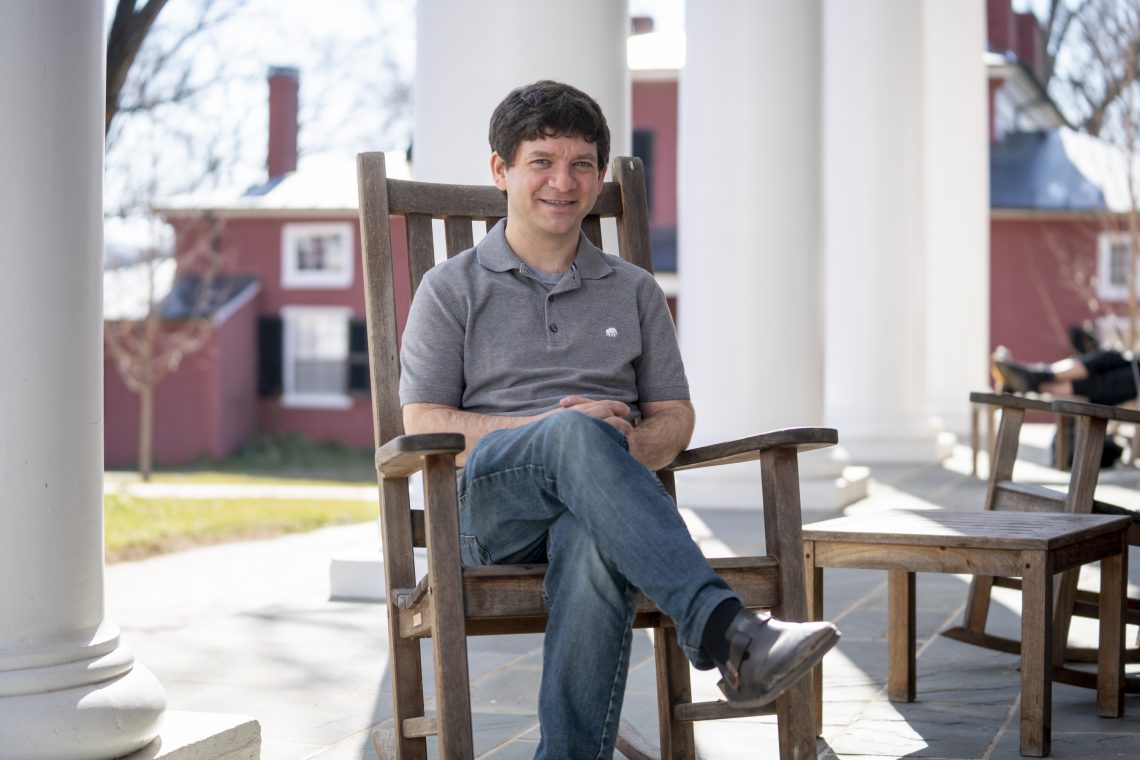Office Hours with Jeff Schatten The assistant professor of business administration combines philosophy and finance to examine organizational behavior in all kinds of business settings.
Liberal Arts Setting
Many business professors take a circuitous route to academia, and I was no different. After earning my B.A. in philosophy, I was a consultant at a social enterprise incubator in South Africa and also taught philosophy for many years. After my MBA, with a concentration in finance, I had offers from consulting firms and corporations, but I knew that was not for me. So I simultaneously started a real estate investment group and began my Ph.D. in organizational behavior, and by the end of that I was sure that I wanted to go the academic route. My dream, from the very beginning of my Ph.D., was to be at the best liberal arts university that had a commerce program. I’ve always been passionate about the intersection of the liberal arts and business education. While my narrow field is organizational behavior, I approach it from an interdisciplinary lens, often drawing on both philosophy and finance.
I think students who have a good business education in a liberal arts setting are well-positioned to emerge as leaders. This combination fosters a more humanistic perspective, because they are more likely to work at understanding where the person across the table is coming from and how to effectively engage with that person. I’ve found that the students at W&L are incredibly motivated and really curious. They ask phenomenal questions and are a joy to work with because they are genuinely interested in learning and developing.
Leading Teams
My favorite course that I teach at W&L is Leading Teams, a Spring Term class at the Augusta Correctional Center where our students and inmates take the class together—a unique moment where undergrads and inmates operate on a level playing field. A liberal arts university like W&L can support this kind of educational opportunity, and it enables me, as a professor, to engage students in discussions and activities that are more challenging, engaging and complex than you can get in a typical classroom setting.
The class is about leadership, but much of what we’re trying to understand the nature of human capacity for change. There’s no better environment to try and investigate change, and the implications of whether we can change, than in a prison. Many of my students come to the table with preconceived notions about what an inmate is, but by the time they leave, they realize, “Oh, these are really complicated people with aspirations, families and fascinating views on the world.”
We study Nelson Mandela and focus entirely on his development while imprisoned for 27 years on Robben Island. It’s an incredible vehicle for examining leadership and allows our students to explore that subject with people who can provide insight about what it means to try to enact change while incarcerated and how the prison experience influences character. The exchange is equally rich for the inmates. The class is empowering for them because they are treated as equals —everyone is a student — and that’s a humanizing experience for them. I keep in touch with several inmates, as well as one who was recently pardoned by the governor.
The Art of Negotiation
Negotiation is about trying to come to an agreement with someone who has overlapping interests, some shared, some unshared. It takes a tremendous amount of skill to get to the bottom of what their interests are, because often you are negotiating with a counterpart who doesn’t want to disclose all of their interests. If you have a complex negotiation you can maximize joint gain so both parties can potentially end up better off. But it takes a large amount of trust. I’m very interested in how trust is formed and the consequences of trust violations, such as the use of deception.
I’m also fascinated by how gender impacts negotiations, and one of the areas I cover in my classes is looking at why women make 82 cents on the dollar to men. One variable, among many others, is that men negotiate more often than women do. By the end of my negotiation class, my students have all participated in one or two different negotiations scenarios. I hope to have imparted how imperative it is for women to negotiate — whether that is about salary, job responsibilities or both — throughout their careers.
If you know any W&L faculty who would be great profile subjects, tell us about them! Nominate them for a web profile.
More About Jeff
Philosophically Speaking
I find that one area that I am interested that often resonates with our students concerns motivation. “What is the role of work in our sense of identity? Why are people motivated to wake up in the morning and spend the day at work?” I’m interested in these kinds of questions about our place in the universe and tying it into understanding people at work.
Frequent Flyer
I’ve traveled to over 40 countries and am looking forward to when I can travel again.
Podcast Host
“Demystifying Organizations,” features experts from around the world. All 50 episodes are available here.
 Jeff Schatten
Jeff Schatten
You must be logged in to post a comment.